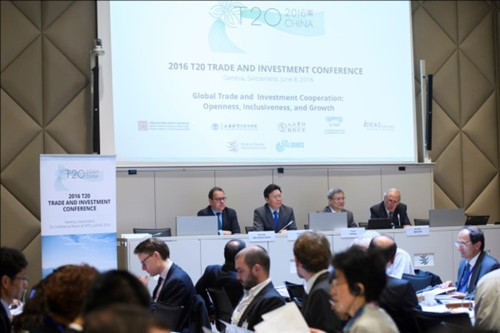China’s G20 presidency to be boon for trade cooperation
Author : Dong Yan, Zhao Qi Source : Chinese Social Sciences Today 2016-07-21

The 2016 Think 20 Trade and Investment Conference was held at the headquarters of the World Trade Organization on June 8 in Geneva, Switzerland.
The 2016 Think 20 (T20) Trade and Investment Conference, the latest in a series of trade dialogues, was held at the headquarters of the World Trade Organization in Geneva, Switzerland, on June 8.
Themed “Global Trade and Investment Cooperation: Openness, Inclusiveness and Growth,” the conference was organized by leading Chinese think tanks, such as the Institute of World Economics and Politics (IWEP) at the Chinese Academy of Social Sciences as well as local think tanks based in Geneva, such as the International Center for Trade and Sustainable Development.
Recognizing the importance of trade and investment to global growth, China aims to strengthen the role of the G20 in international trade and investment governance. The G20 Trade and Investment Working Group under the G20 framework has been set up for the first time, and the G20 Trade Ministers Meeting has also been made routine and institutionalized. The construction of a new platform for cooperation under the G20 framework will likely be one of China’s major contributions during its G20 presidency.
The emphasis put on trade and investment by the Chinese presidency reflects the country’s strong commitment to the multilateral trading system, said Roberto Azevêdo, director-general of the WTO. The T20 brings together think tanks, experts and academics, which have long been valuable partners of the WTO that to provide analytical depth to ongoing discussions at the G20, he said.
Azevêdo said there is a need to share strategies on such topics as small and medium-sized enterprises, the service industry, e-commerce and investment. Multilateral cooperation should be strengthened because a multilateral deal will allow greater efficiency and flexibility than regional agreements with overlapping rules. The transition from a period of reflection toward taking concrete actions is necessary if we want to promote multilateral cooperation, he said.
Yu Jianhua, permanent representative and ambassador of China to the WTO, said both the WTO and the T20 can play an active role in the G20. G20 members should transition from a period of stimulus through financial and monetary policies to a new period of stimulus that emphasizes more on trade and investment policies. G20 members should pay attention to the significant role of trade and investment in boosting economic development, creating jobs and spurring innovation, he said.
Of all the possible paths to strong, sustainable and balanced growth pursued by the G20, the most important is to maximize returns on trade and investment, said Zhang Yuyan, director of the IWEP. That requires the deepening of the international labor division and minimizing transaction costs that hinder the expansion of market, he said.
Some commentators have speculated that the decline in China’s imports, especially in processing trade, has played a significant role in the downturn on the global economy. Song Hong, a research fellow from the IWEP, said this viewpoint is incorrect, arguing that the decline of China’s import in processing trade accounted for only about 5 percent of the total global decline. China may address rising labor costs by automating production in the future, he said.
James Zhan, director of the Division on Investment and Enterprise at UN Conference on Trade and Development said the G20 should come up with ways to coordinate trade and investment policies to avoid future inconsistency and determine the possible effects of the new generation of regional trade agreements.
Sean Miner, China program manager and research associate at the Peterson Institute for International Economics, suggested that the European Union, the United States and China should play a more constructive role in the WTO by leading the development of regional trade agreements.
Ye Shengtao made Chinese fairy tales from a wilderness
Ye Shengtao (1894–1988) created the first collection of fairy tales in the history of Chinese children’s literature...
-
How northern ethnicities integrated into Chinese nation
2023-09-18
-
Mogao caves
2023-09-12
-
Mogao Grottoes as ‘a place of pilgrimage’
2023-09-12
-
Time-honored architectural traditions in China
2023-08-29
-
Disentangling the civilizational evolution of China
2023-08-28
-
AI ethics in science fiction
2023-08-23














 2011-2013 by www.cssn.cn. All Rights Reserved
2011-2013 by www.cssn.cn. All Rights Reserved